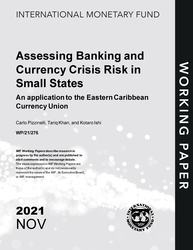
Assessing Banking and Currency Crisis Risk in Small States:An application to the Eastern Caribbean Currency Union
Assessing Banking and Currency Crisis Risk in Small States: An application to the Eastern Caribbean Currency Union
READ MORE...
Volume/Issue:
Volume 2021
Issue 276
Publication date: November 2021
ISBN: 9781513599861
$5.00
Add to Cart by clicking price of the language and format you'd like to purchase
Available Languages and Formats
| English |
Prices in red indicate formats that are not yet available but are forthcoming.
Topics covered in this book
This title contains information about the following subjects.
Click on a subject if you would like to see other titles with the same subjects.
Banks and Banking , Economics- Macroeconomics , Business and Economics - Statistics , Economics / General , Banking crises , currency crises , early warning signals , currency boards , small states , risk in small states , currency board , crisis likelihood , modeling banking , banking crisis , Currency crises , Banking crises , Conventional peg , Financial statistics , Global , Caribbean
Summary
To complement the early warning signals literature, we study the determinants of banking and currency crises for small states and currency boards. Building on the crisis dataset by Laeven and Valencia (2020), we estimate a binominal logit model to identify the determinants of crises, and as a case study, we apply our models to the Eastern Caribbean Currency Union (ECCU). Our findings largely confirm past studies’ results that both external and domestic fundamentals matter in predicting crisis likelihood, but we find that small states and fixed exchange rate regimes are more sensitive to these fundamentals, compared to larger economies. Our empirical results also suggest that for currency board economies, keeping a high level of the foreign reserve cover—the “backing ratio” defined as official foreign reserves as a share of central bank demand liabilities—is critical to reduce the likelihood of both banking and currency crises. The backing ratio is particularly important during years of global economic downturn.
Copyright © 2010 - 2026
Powered by:
AIDC



